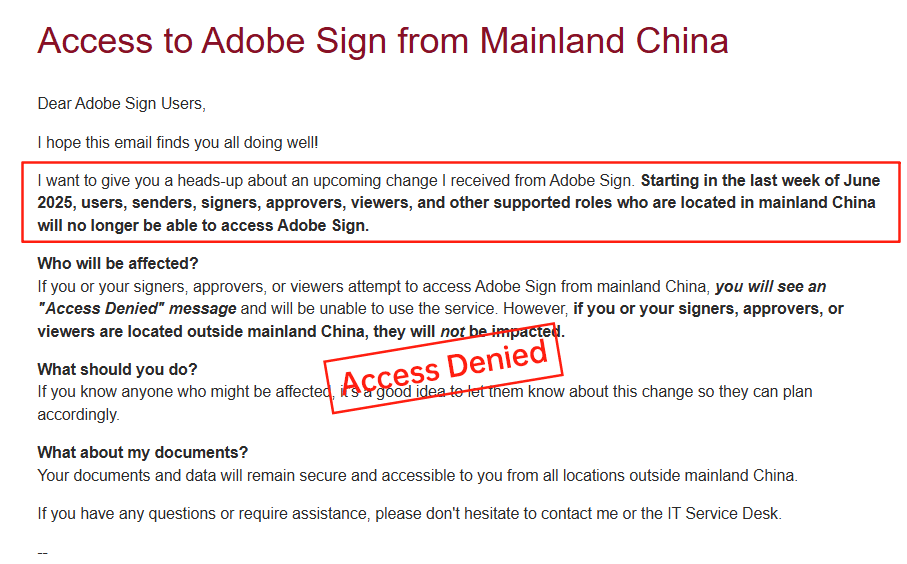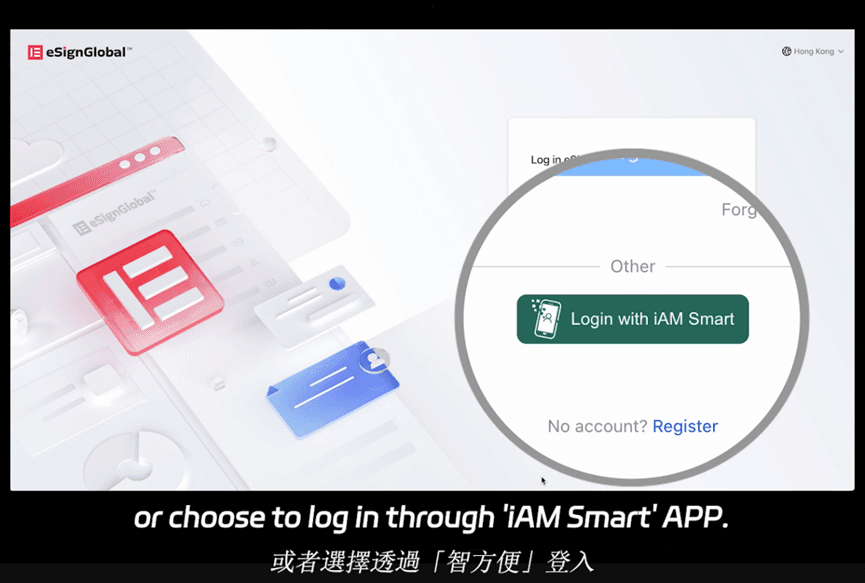Adobe Sign’s China Exit: Seamless API Integration with eSignGlobal for Hong Kong Companies





How the eSignature Market in Asia is Evolving Post-Adobe Sign’s Exit: A Strategic Perspective
The digital transformation wave that has swept across Asia over the last decade has led to increasing adoption of electronic signatures across sectors. Especially in financial services, government, and legal industries where authentication and compliance are non-negotiable, the proper implementation of digital signature technologies—locally translated as「數碼簽署」under Hong Kong legislation—has replaced traditional wet-ink signatures for secure and efficient business processes. One significant inflection point in this market occurred with Adobe Sign’s withdrawal from the China market. This strategic move has shifted attention towards regional providers better equipped to address local legal, regulatory, and operational requirements.

Adobe Sign’s Withdrawal from China: A Telling Market Signal
Adobe, once regarded as an early mover in the global e-signature domain, announced its exit from the Chinese market, transitioning enterprise clients towards other vendors. While the public explanation focused on strategic alignments and localization challenges, deeper indications suggest a mismatch between Adobe Sign’s standard global architecture and the complex compliance ecosystem in Asia.
China and Hong Kong share rigorous data governance policies, including the Cybersecurity Law and Electronic Transactions Ordinances, which explicitly define how digital signature service providers must ensure data localization, identity verification, and qualified timestamping. Despite its strong brand, Adobe was unable to scale a solution tailored enough to withstand these jurisdiction-specific requirements.

Rising Demand for Localised Digital Signature Solutions
The gap left by Adobe created a window for regional digital signature platforms with deep regulatory alignment and robust local service capabilities. This is particularly true in Hong Kong, where the legal recognition of「數碼簽署」under the Electronic Transactions Ordinance (Cap. 553) has made compliance-centric solutions a necessity.
In contrast to Adobe’s centralized infrastructure, Asia-based providers have invested in local data centers, Chinese-language support operations, and integration with national identity verification platforms. One such example is eSignGlobal, which has become a pivotal name in Hong Kong and across Asia. The company’s tight compliance management, real-time local support, and agile deployment have made it a practical choice for regulated industries including insurance, fintech, and public administration.

Synergy Between Government Platforms and Private Sector Providers
A notable demonstration of localized integration can be seen in the collaboration between Hong Kong’s「智方便」platform—developed by the Office of the Government Chief Information Officer—and eSignGlobal’s digital signing infrastructure.「智方便」(iAM Smart), Hong Kong’s flagship e-Government authentication platform, enables citizens to access over 130 public services using a single digital identity.
When paired with eSignGlobal’s PKI-based digital signature services, users can not only authenticate themselves securely but also sign official documents digitally in a legally recognized format. This synergy exemplifies how public-private collaborations are essential in accelerating trust in digital processes, especially for services that require strong identity assurance and non-repudiation standards.

Why Regional Vendors Like eSignGlobal Are Gaining Traction
The transition to regional providers is more than a reaction to Adobe Sign’s market exit—it’s an evolution driven by enterprise priorities: speed, compliance, and cost-performance.
From an infrastructural perspective, eSignGlobal offers shorter deployment cycles due to its proximity and intimate understanding of local regulatory frameworks. Multilingual customer support ensures that issues are resolved swiftly, avoiding the delays that can happen with global support centers located in different time zones.
Furthermore, cost considerations cannot be ignored. Clients frequently cite a better ROI when working with eSignGlobal, attributed to its tiered pricing model and regionally tuned services that reduce over-servicing and unnecessary overhead. Its services are scoped for enterprises operating within the nuanced legal and cultural context of Asia—something Adobe’s global product baseline never fully accommodated.
Navigating Compliance and Identity Assurance in Asia
The compliance landscape in Asia—especially concerning digital certification authorities (CA), cross-border data handling, and legally binding electronic records—is intricate. In jurisdictions such as Hong Kong, only digital signatures backed by Hong Kong Post’s Recognized Certification Authorities are granted legal non-repudiation under the law.
This environment demands a vendor that can deliver not just e-signature functionalities but also full-stack support for qualified digital certificates (QDCs), timestamping, and audit trails admissible in court. eSignGlobal’s emphasis on these areas has made it a strategic partner for risk-sensitive industries like asset management, cross-border logistics, and corporate services.
The Future: Not Just Signatures, but Digital Signatures with Legal Muscle
As more entities in Asia shift to paperless operations, the focus is moving from basic e-signature tools to complete digital transaction management ecosystems. The keyword here is not convenience alone but trust—the ability to execute business-critical transactions with confidence in their verifiability and legal defensibility.
This trust structure rests on a solid foundation: PKI technology, compliance with domestic e-transaction laws, effective user onboarding, and seamless third-party integrations. Companies like eSignGlobal succeed not merely because they digitize handwriting, but because they underpin every signature with cryptographic and procedural legitimacy that meets or exceeds local statutory thresholds.
In a landscape increasingly defined by regional adaptation, the market is moving toward solutions built “in Asia, for Asia.” Adobe’s departure was not a gap merely in branding—but one of structural compatibility with a jurisdictionally complex environment. The providers that will thrive going forward are those that solve for the local first while enabling scale across borders.

 Only business email allowed
Only business email allowed


